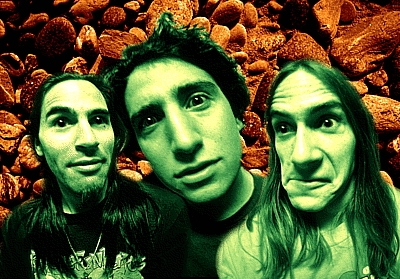 Click to view a jpeg image 0.124 MB.
Click to view a jpeg image 0.124 MB.
It used to be that musicians had to scrounge for music gigs and record labels in order to be heard. Now artists can find their own audience by distributing and promoting their music electronically through the Internet Underground Music Archive, (IUMA)-the Internet's first free, high-fidelity archive.
It began just a year ago when three UC Santa Cruz students combined their computer savvy and knowledge of the Internet with their passion for music. Together Rob Lord, 24, Jeff Patterson, 21, and Jon Luini, 26, have created something bigger than they ever imagined. They're receiving national acclaim for defining the music distribution industry for the next century.
 Click to view a jpeg image 0.124 MB.
Click to view a jpeg image 0.124 MB.
IUMA levels the playing field with alternative and mainstream music in the same game. For the price of about a dozen demos any artist can get their music online. About 250 signed and unsigned bands are now available on IUMA--from the alternative groove of an 80 year-old grandmother singing Blame It On the Monkeys, recorded live at the Los Angeles Zoo, all the way to more mainstream artists like Madonna and Sting. And it's all being made possible through the most advanced technology on the planet. IUMA is using Silicon Graphics equipment to author and serve content.
Listeners can log on and download songs, musician bios and artwork. You can even interact directly with the musicians to critique their music. You have three choices of music formats, full length mono, full length stereo, and a 15 second excerpt, so you can get a taste before you decide to download the whole thing. There's plans in the works to make excerpts on the fly. Soon you'll be able to choose however many seconds you want to hear and click on the timeline so you can listen to any part of the song.
IUMA Web site downloads have quadrupled with the addition of Silicon Graphics workstations and servers. "When we got the Challenge S server we went from about 10,000 hits a day to almost 40,000 hits," says Luini, who calls himself the `renegade system administrator', "our monthly numbers hit the millions."
The IUMA team is using an Indy workstation for a slew of media authoring tasks such as capturing and manipulating digital audio, video, and graphics. They record the music digitally in mono and stereo directly onto the Indy workstation, then compress and encode it. The team then creates digital artwork, videos, and photos, and any text needed to accompany the song, and uploads everything to the Challenge S server for mass distribution.
Co-founder Lord says he's tons more efficient now that he has an Indy workstation. "These systems are perfect for what we're doing. Indy has all the graphics already on board, the video and audio input, and the various utilities. And it's incredibly responsive and fast enough to play two different songs at the same time."
A handful of volunteers are working late into the nights to make significant interactive improvements to IUMA. "When you're pullin' a 24-hour day, having a machine that's capable of doing all the multimedia authoring you can think of makes the long hauls more enjoyable," says Lord. They're busy creating features so you can pick songs randomly, do online voting, and make top ten lists of your favorite songs. Soon you'll be able to say `I want to see all of the rock bands in San Francisco for the last six months' and just those bands will come up.
If you're a Jazz fanatic and you don't want the Heavy Metal, Rock, or the Country you'll be able to narrow your focus right from the home page. Using the Challenge S as the database back end will make it much easier for listeners to search multiple keys. So immediately as you dive in you won't see the two-thirds you don't want to see.
Soon you'll be able to place orders for actual CD's through IUMA and they'll send them out through the mail. "Then we want to make it possible for people to get music right off the Net through Indy, with systems set up in several key locations," says Patterson. "Maybe radio stations and record stores, these locations just need any high speed Net connection."
The next step for IUMA is to provide music to listeners right in their home. "Let's say down the road everyone has Silicon Graphics equipment in their living room and they hook it up to their stereo- then they don't need CDs anymore. They can collect music directly off the Net in real-time," continues Patterson. "The Indy can already hook directly into the stereo. It has all the jacks for it, just plug it in and you're all set."
This idea is not as far fetched as it sounds. In fact, Silicon Graphics and Time Warner are now testing interactive, set-top devices in homes in Orlando, Florida. And the Silicon Graphics- Unintended partnership is securing real-time, three-dimensional, interactive entertainment for the home.
The only thing limiting IUMA right now is Internet bandwidth. They're just waiting for the pipe to open up. "Then people will be able to share music on machines powerful enough to do everything. Which at this point it isn't PC's, it isn't Macintoshes, it isn't even Suns. It's MIPS based systems from Silicon Graphics. Then there won't be anymore need for physical CD's. And that's where it gets really intense," exclaims Lord.


